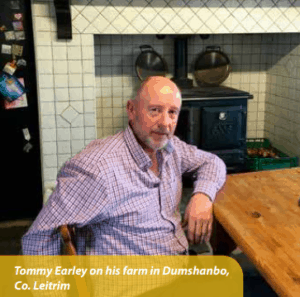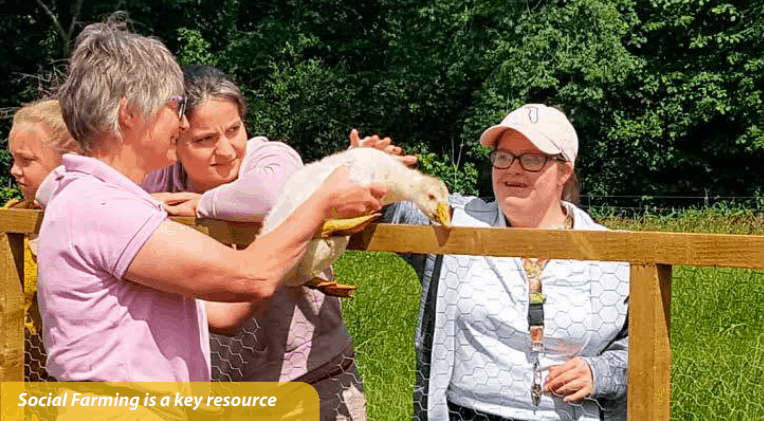Social Farming supports multifunctional agriculture as well as current health and social care policy. It does this by promoting inclusion through allowing participants, who have a range of needs and challenges, to engage in everyday on-farm activities.
This engagement helps participants to boost their social skills, self-esteem and confidence, as well as improving their general wellbeing by being out and involved in the natural environment.
Social farming participants can come from a range of different backgrounds including people experiencing mental health issues, people with intellectual, physical and sensory disabilities, the long-term unemployed, young people who are at risk and refugees, amongst others.
Participants choose to become involved in social farming themselves and are assigned to farms based on their interests and goals. Placements usually last for a period of 10 to 12 weeks and take place once a week. Social farming in Ireland is particularly unique in that it takes place on ordinary working farms, meaning that those participating are based in non-clinical environments, unlike in other countries such as the Netherlands and Norway.
Farmers who facilitate social farming placements on their farms receive payment for their time and expenses incurred, helping to boost their income and utilise the natural and human capital of the farm to the fullest.
Social Farming Ireland (SoFI) is one of the key organisations driving Social Farming in Ireland. It was established in 2015 on the back of an EU funded project ‘Social Farming Across Borders’ (SoFAB) which operated in the Border counties of Ireland and Northern Ireland from 2011 to 2014. SoFI was set up to continue to develop Social Farming in the Republic of Ireland and opened in April 2015 in Drumshanbo, Co. Leitrim, led by Leitrim Integrated Development Company.
SoFI has been strongly supported and funded since 2015 by the Department of Agriculture Food & the Marine, largely under the CEDRA fund. One of its key roles is to support the development of a national Social Farming network and to this end it collaborates with a number of Local Development Companies. These are regionally based and include Leitrim Development Company (Border Midlands), West Limerick Resources (South West), Waterford LEADER Partnership (South East) and South West Mayo
Development Company (West).
Together they support the practical roll out of Social Farming regionally and act as a support to the different intermediaries which come together to make social farming happen: the farmers, the health and social care organisations, and the participants. Since its inception in 2015, SoFI has delivered over 6,300 placement days to approximately 790 participants on 77 social farms throughout the country.
Tommy Earley, Drumshanbo, Co. Leitrim
Tommy Earley runs a 100-acre farm in Drumshanbo, Co. Leitrim. Tommy’s farm is organic and currently rears Aberdeen Angus cows and calves, grows vegetables and
timber and also has a number of trails for his eco-tourism business ‘Mount Allen Ecotours’. It was his involvement in hosting farm Eco-walks which led to his involvement in social farming. This, along with a social farming event he attended where he heard one of the participants share his story.
 Tommy relays this participant’s experience whereby “everything had been going super for him – married, house, business really going well – but he got knocked out with depression. He got a chance to go on a social farm and it made a major difference to him, so I thought if I could get it going on the farm here it might make a difference too”. Tommy then made contact with SoFI to get more information on becoming involved in social farming and to receive training.
Tommy relays this participant’s experience whereby “everything had been going super for him – married, house, business really going well – but he got knocked out with depression. He got a chance to go on a social farm and it made a major difference to him, so I thought if I could get it going on the farm here it might make a difference too”. Tommy then made contact with SoFI to get more information on becoming involved in social farming and to receive training.
Benefits of Social Farming
Tommy described one example of how his farm has helped some social farming participants who were non-verbal. He outlines that ‘‘the hope was that they would get a couple of new words…So what I would do was take a picture of the hen out there and got it photocopied and we made a little scrapbook. So we’d go out and be looking at the hen and then come back in to the table and look and the picture in the scrapbook and say ‘hen, hen’, by the time they had left they had 5 or 6 words… So it’s making a big difference”.
Are you thinking about hosting Social Farming on your farm?
Tommy’s advice for those thinking about becoming involved in social farming is to get as much information as possible from SoFI and “if you can get out onto a social farm
when there is a group there, and…just see how it works, it’ll be a good experience”.
For more information and resources on Social Farming in Ireland, please see: www.socialfarmingireland.ie


